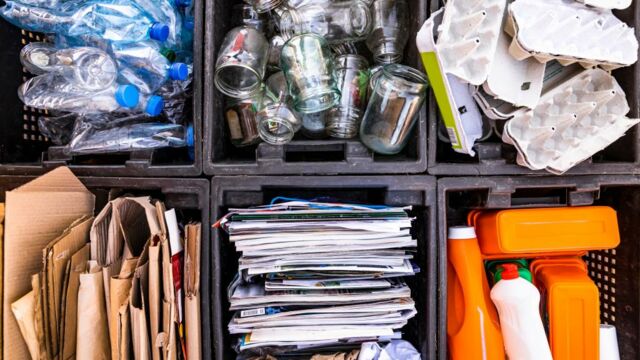When it comes to our own personal fight against climate change, recycling seems like the first line of defence. But for some, the sorting and cleaning of tin cans, cardboard and plastics can become somewhat overwhelming. So much so that, according to a survey by Evian, one in four Brits have admitted to not always recycling correctly.
Discover our latest podcast
Twenty-two per cent of Brits are unsure if plastic bottles can be recycled
Evian’s poll, consisting of 2,000 UK residents, found that 26% of respondents admitted to not always recycling their plastic bottles. Meanwhile, 22% of participants didn’t know if a plastic bottle could be recycled in the first place.
But, this recycling confusion isn’t limited to plastic bottles. According to another study commissioned by Robinsons, three in ten Brits don’t know whether soft plastic could be recycled (soft plastics are recyclable in specific facilities). A further one in five didn’t know that tinfoil, provided that it’s clean, could also be chucked in with the recycling.
However, despite having difficulty navigating the ins and outs of recycling, Evian’s survey found around 30% of people want to do more to improve their recycling habits, and 57% of respondents would recycle more if they knew it would reduce their carbon footprint.
Gemma Morgan from Evian told The Mirror: ‘It's great to see so many consumers want to do more to improve their recycling efforts and are already taking steps to reduce their carbon footprint.’
Now more than ever, it is vital that we all come together to tackle the climate crisis.
‘That's why, as a carbon-neutral brand, we want to raise awareness about the importance of recycling during this Recycle Week and how it can contribute to reducing carbon emissions.’
How much do Brits recycle?
In light of recycling week, Robinsons, one of this year’s sponsors, also commissioned a survey of 2,000 people to find out just how much the average UK resident recycles. And, while some Brits aren’t all that clued up on the nuances of recycling, others seem to be experts, recycling up to a quarter of a million items over their life.
Here’s a further breakdown of what the average Brit is expected to recycle over their lifetime:
- Tin cans - 31,449
- Pieces of paper - 22,932
- Plastic bottles - 16,707
- Cardboard boxes - 15,397
- Envelopes - 15,069
- Plastic (other) - 14,086
- Plastic pots - 14,086
- Cardboard (other) - 13,759
- Glass bottles or jars - 12,776
- Yoghurt pots - 12,448
- Milk bottles - 9,828
- Glass (other) - 9,172
- Newspapers - 8,845
- Metal (other) - 7,534
- Wine bottles - 7,207
- Magazines - 7,207
- Pizza boxes - 5,896
Craig Stephens, campaign manager for Recycle Now, released in a statement: ‘We’re thrilled to have Robinsons’ support for this year’s campaign.’
We are focused on how recycling can help fight climate change and how, by recycling even better, we can have a bigger impact on our environment.
‘The research done strengthens the message of the campaign and how we can all do just a little bit more to make an even bigger impact on climate change.’
According to the website Carbon Footprint: ‘Throwing things away is a waste of the energy and the resources taken to make the product. Reducing the number of things that need to be thrown away, reduces the amount of materials which have to be quarried and mined.’
However, while recycling reduces the need to manufacture raw materials, the processes, machinery and transport involved in recycling still impact the environment. So, before jumping straight to recycling, it’s a good idea to look back on the steps ‘reduce, reuse, repair’ to see if you can extend the lifecycle of your items or reduce the amount of waste from the get-go.
To learn more about recycling this recycling week, visit the Recycle Now website.















